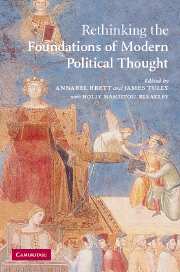Book contents
- Frontmatter
- Contents
- List of contributors
- Preface
- Part I Introduction
- Part II Rethinking the foundations
- 3 Foundations and moments
- 4 Skinner, pre-humanist rhetorical culture and Machiavelli
- 5 Unoriginal authors: how to do things with texts in the Renaissance
- 6 ‘The Best State of the Commonwealth’: Thomas More and Quentin Skinner
- 7 Scholasticism in Quentin Skinner's Foundations
- 8 Scholastic political thought and the modern concept of the state
- 9 ‘So meerly humane’: theories of resistance in early-modern Europe
- 10 Hobbes and democracy
- 11 A lion in the house: Hobbes and democracy
- 12 Hobbes and the foundations of modern international thought
- 13 Surveying The Foundations: a retrospect and reassessment
- Bibliography
- Index
10 - Hobbes and democracy
Published online by Cambridge University Press: 19 February 2010
- Frontmatter
- Contents
- List of contributors
- Preface
- Part I Introduction
- Part II Rethinking the foundations
- 3 Foundations and moments
- 4 Skinner, pre-humanist rhetorical culture and Machiavelli
- 5 Unoriginal authors: how to do things with texts in the Renaissance
- 6 ‘The Best State of the Commonwealth’: Thomas More and Quentin Skinner
- 7 Scholasticism in Quentin Skinner's Foundations
- 8 Scholastic political thought and the modern concept of the state
- 9 ‘So meerly humane’: theories of resistance in early-modern Europe
- 10 Hobbes and democracy
- 11 A lion in the house: Hobbes and democracy
- 12 Hobbes and the foundations of modern international thought
- 13 Surveying The Foundations: a retrospect and reassessment
- Bibliography
- Index
Summary
I think that what Quentin Skinner's pupils learned first from him, before they absorbed any particular ideas, and even before they understood his methodological advice, was how to live an intellectually adventurous and courageous life. I remember as an undergraduate the excitement of his lectures in 1967 and 1968, which were the basis (as it later emerged) for The Foundations of Modern Political Thought; we watched in awe as this rather slight figure on the podium showed that one need be beholden to no one in developing one's own ideas, and that what mattered was how elegantly and powerfully one could defend them. Almost forty years of thinking about this same material has not dimmed my admiration for the lectures, for the subsequent book and for its author; everything I have thought has begun (and sometimes – surprisingly often, actually – ended) with his ideas. This paper is an example of the process.
What I want to raise in it is a question which has increasingly seemed to me to be worth putting directly to the account of modern politics implicit in the book, and in much of Skinner's subsequent work. It is about the role in this account not of republicanism but of democracy. As we all know, many of the republican theorists whom he has studied, and from whom he increasingly wants to bring lessons home to modern politics, were not democrats in anything like our sense of the word; most of them were principally (in so far as they had clear constitutional ideas) supporters of a kind of mixed government.
- Type
- Chapter
- Information
- Rethinking The Foundations of Modern Political Thought , pp. 171 - 190Publisher: Cambridge University PressPrint publication year: 2006
- 19
- Cited by

